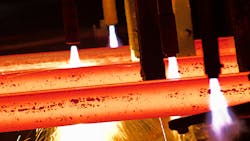Green Steel: Volvo, Mercedes-Benz Announce Commitments to Fossil-Fuel-Free Steel
As automotive manufacturers around the world pivot towards production of electric- or hydrogen-powered vehicles to reduce their impact on greenhouse gas emissions, two automakers are turning their attention to another emissions sore spot: steel production. Volvo Cars and Mercedes-Benz AG have both announced plans to use sustainably produced steel in future vehicles.
Towards the end of May, Mercedes-Benz AG announced it would purchase an equity stake in a Swedish start-up, H2 Green Steel, and launch vehicles using the company’s CO2-free steel “as early as 2025” according to Markus Schäfer, Mercedes-Benz Cars COO. And on June 24, Volvo Cars announced it would collaborate with SSAB, a Swedish steelmaker, on researching, developing, producing and commercializing “fossil-free” steel using the steelmaker’s Hybrit hydrogen reduction process.
Volvo says it will begin manufacturing its first concept cars and machines with SSAB’s greenhouse-friendly steel starting this year and models using the metal would be available within five years.
According to the McKinsey consulting group, steel production in 2018 emitted about 8% of global carbon dioxide emissions. New methods of greenhouse-gas-free steel production replace the coking coal of a traditional blast furnace with electricity and hydrogen, producing water vapor as a waste gas instead of carbon dioxide.
In a fact sheet published on hydrogen-produced steel, the World Steel Association notes that, in a traditional blast furnace, iron is reduced from iron ore using carbon from natural gas or coal. This process emits, the WSA says, 2.21 tons of carbon dioxide for each ton of iron produced from ore on average.
In company statements, both Volvo Cars and Mercedes cited encouragement of the steel industry and overall carbon neutrality goals as motivation to look into new ways of sourcing steel.
With its stake in the H2 Green Steel startup, “Mercedes-Benz is sending an important signal to accelerate change in the steel industry and increase the availability of carbon-free steel,” said Schäfer.
“We are determined to be a climate-neutral company by 2050 in line with the Paris Agreement,” said Martin Lundstedt, CEO of Volvo Group. “This means that our vehicles and machines will be emission-free when in operation but also that we will review the materials, like steel, used in our products and will gradually switch to fossil-free alternatives here as well.”
Martin Lindqvist, President and CEO of SSAB, said their collaboration with Volvo would be “a giant leap towards an entirely fossil-free value chain all the way to the end consumer.” In a company statement, SSAB noted that their process uses fossil-free hydrogen, which is made from renewably sourced electricity and water.
Volvo, the companies say, plans smaller-scale serial production in 2022 with a gradual escalation towards mass production further on. SSAB, meanwhile, intends to use the partnership with Volvo to accelerate the Hybrit hydrogen-steel program that it, LKAB, and Vattenfall have been developing since 2016. SSAB says it intends to begin supplying fossil-free steel at a commercial scale by 2026.
About the Author
Ryan Secard
Associate Editor
Ryan Secard joined Endeavor B2B in 2020 as a news editor for IndustryWeek. He currently contributes to IW, American Machinist, Foundry Management & Technology, and Plant Services on breaking manufacturing news, new products, plant openings and closures, and labor issues in manufacturing.
